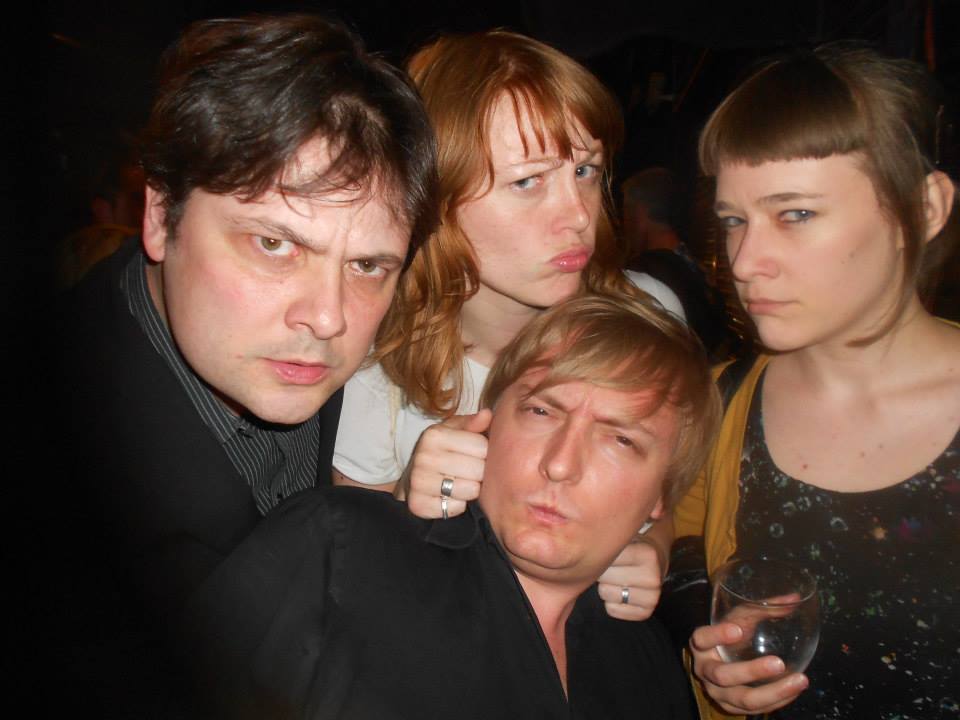Review: Sage & Time 23/05/12
-reviewed by Koel Mukherjee–
@ the Charterhouse
This edition of Dirty Hands’ Sage and Time promised two truly excellent featured poets in Keith Jarrett and James Webster (both of whom will be at Sage & Time’s 2nd Birthday this coming Wednesday 18th of July!), and the usual diverse open mic’ers and cheerful, inclusive vibe. This month the three minute time limit for the open mic was being enforced more strongly than I’ve seen before, but the informal-yet-emphatic way in which the rule was enforced was disarmingly funny and kept things light-heartededly flowing along.
On to the night’s poetry!
- Co-host Richard Marsh never disappoints.His peppy opening piece told the tale of a bespectacled lad out on the town (“I’m going to be the speccy James Bond tonight”), who has an encounter with a fellow four-eyed hottie. The piece’s fast, choppy rhymes, comic swagger and nerd pride, produced some gloriously terrible glasses-based puns ( “tonight I’m going to be my own Specsaver”). A truly spec-tacular start to the evening.
- Esther’s accomplished “Travelling Light” was a beautiful, intimate meditation on death and grief, reflecting on a recent bereavement. The piece focused on vivid fragments of images and memories associated with the person who had died. Threaded with these were more general thoughts on life and the reasons for the things that happen in it, which gave the poem an overall feeling of acceptance, calm and ultimately, empowerment, the poet resolutely urging us all not to forget that “life – this life – is for living.” This performance made the hairs on the back of my neck stand up.
- Cezanne’s “Sex with the Ex” was a cheeky and fun cautionary tale against relapsing into sleeping with an ex. Some clumsy rhymes and corny phrases made it feel a bit clunky and flat, however her sheer relish and gusto made for an entertaining performance.
- Lettie McKie issued acomically exaggerated call to arms for fellow sufferers under the yoke of anti-ginger prejudice, with a gradual morph into advocating ginger supremacy which was enjoyably sinister. However, emphasising the oppressed status of gingers by comparing it to that of every “she/he” (evoking a commonly used slur against transgender men and women), seemed highly unnecessary, and sat uncomfortably within the comic absurdity of the piece.
- Lucy Ayrton has an expressive and versatile voice that is very good at animating what she’s performing. Her piece about a miserable corporate job she once had took us straight into the world of that office, conjuring mechanical office-phone-speak, the hollow enthusiasm she tried to feign, the acerbic disgust of how she really felt, the disapproval of managers, and the disappointment and sadness of unfulfilled dreams.
- Elaine O’Neill wittily illustrated the complicated, merry-go-round bureaucracy of the NHS with some fun wordplay on hospitals / hospitable and doctors’ practices and surgeries / doctors practicing surgery.
- Amy Acre’s “1.21 Gigawatts” reflected on the failure of a past relationship. An accomplished marriage of language and rhythm made this piece flow beautifully, packing it full of vivid imagery. And numerous Back to the Future / time travel references (including, of course, the title) presumably referencing an in-joke in the relationship, gave the piece a particularly intimate feel.
Featured Poets
- Keith Jarrett is a wonderful performer. He knows his material inside out, to the point of complete mastery over every word, resulting in supremely well-judged pacing and tone that makes each piece so captivating he could draw you in just by reading the phonebook. (That said, his words are pretty great too, so there’s plenty to enjoy once you’ve been drawn in).
- For sheer entertainment, my favourite of his pieces was “Midsomer Murdered”. This satirised the perspective of the Midsomer Murders producer who defended the show’s lack of ethnic minorities as representing “the last bastion of Englishness”. The producer’s refusal to allow ethnic minorities the right to be murdered in his fictional village gets increasingly and absurdly comical as it references the famously ridiculous ways people are killed: “There will be … no pillows to smother you goodnight”, “no poisoned teas”, “You are too dark to stain these stable doors with your blood”. And, perfectly, “So shut up and live.” The deadpan sincerity of the delivery made this all the more hilarious.
- “You’ve been writing poetry again” was the piece that had the most resonance in a room full of poets. This was a piercing self-examination that started out as light-hearted and playful, the poet chiding himself for his “dirty addiction to watching couplets form” and “urges to splurge your emotions onto innocent sheets”. Gradually though, it revealed deeper layers of self-doubt and suggestions that poetry is both his armour for dealing with “the cold daylight of the outside”, and an excuse not to. The piece ended on an exceedingly relatable self-rebuke for wasting time messing around with language while “cities riot and burn” and “there are too many wrongs to write”.
- James Webster often exudes a sort of charming awkwardness on stage, which sits surprisingly well with the fierce intent and passion of much of his poetry. His style is at its best when performing a piece that combines strong emotional / political conviction with moments of playfulness and self-deprecation – it’s like seeing the different facets of someone’s personality reflected in their performance. His feature slot did come with added nervousness – which gradually dissipated as he got more into the set.
- The highlight of his set was one of the highlights of the whole night, a searingly honest and raw yet entertaining poem imagining a conversation between the poet as he is today, and his younger self.
- It worked because he really committed to the idea of such a conversation: there’d be disagreements and dislike, probably on both sides, but also similarities (it’s still the same person after all), probably some exchanging of advice and jokes, and you’d naturally want to compare notes on the worlds of the past and the future.
- James’s poem contained all of these aspects, giving it a great mix of humour and emotional depth. The aspect that really drove the poem was present-James’s ruthless deconstruction of his former self’s “Nice Guy” self-image / entitlement complex. This harshness was coupled with some poignant life advice (“Stop treating life as a test/ We’ve already passed / We’re alive, and ace”) and tempered by comical nods to shared interests and differences between their past and future worlds. Despite its anger and disgust in places, this was ultimately a positive reflection on the ever-unfinished work of becoming the person you want to be. The piece’s lovely last line reflected this optimistic spirit: “we’ll stop worrying about being a nice guy, and start to worry about being a good man.”
- I also enjoyed his long-lens take on the “we are the 99%” protest slogan. Pointing out that the consistent exploitation and subjugation of the many by the few is a recurring theme in human history, he declared, simply, “We want more”, more food, more of a voice, and “just a little more justice”. A poem full of intense conviction and humanity that gave me goosebumps.
Conclusion A nice mix of regular and not-so-regular voices (all of whom I would have liked to mention), brilliant feature slots, a good range of styles, perspectives and subjects and a satisfying balance of humour and depth overall. Great poetry, great people and great fun.




